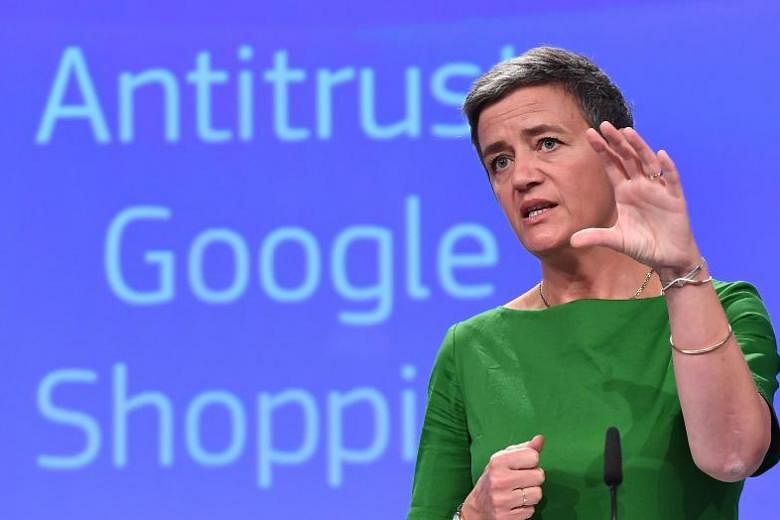NEW YORK - Google's whopping 2.42 billion euro fine may have far-reaching impact not just on the world's biggest search engine but other tech "super-monopolies" like Amazon, Apple and Facebook, say analysts.
In slapping the record penalty on Google on Tuesday (June 27), the European Union's antitrust regulator ruled its search engine stacks the deck in favour of its own comparison-shopping service.
EU competition chief Margrethe Vestager also warned that the clampdown on Google's shopping search service sets a "precedent" that could be used to scrutinise the search-engine giant's behaviour in other areas.
"The shopping reasoning applied to other services would totally impact Google's business model," Ombline Ancelin, a lawyer at Simmons & Simmons in Paris, told Bloomberg News. The decision means other specialised "vertical" Google search services such as maps, travel and restaurant reviews are effectively "on parole", she added.
But Ancelin also said the overall message sent Tuesday doesn't bode well for other technology giants.
Agreeing, Fortune magazine said the ruling was a game-changer for companies like Amazon, Apple and Facebook, which have taken to leveraging new products off a dominant core business such as e-commerce, smartphones or social media.
The magazine in a report on Tuesday highlighted the EU regulator's sensitivity towards "network effects", the phenomenon by which services such as Google's search engine and ad business, or Facebook's social media platform become ever more effective the more people use them.
Network effects are a core part of the business strategy of Internet companies but to an antitrust regulator like Vestager, they create "high barriers to entry" for competitors, and ultimately reduce consumer choice, Fortune said.
Elevation Partners co-founder Roger McNamee said Google's business model isn't structured in a way that allows for competition, as similarly Facebook's "monopoly" has boosted Instagram and WhatsApp.
"Google, Facebook, Amazon are increasingly just super-monopolies, especially Google and Facebook," he said on CNBC's "Squawk Alley. "The share of the markets they operate in is literally on the same scale that Standard Oil had ... more than 100 years ago - with the big differences that their reach is now global, not just within a single country."
As for Google, Tuesday's landmark decision may influence ongoing probes into Google's Android mobile-phone software, bundled for free with Search and other Google services on handsets, and its AdSense online advertising platform.
Jonas Koponen, a lawyer at Linklaters in Brussels, believes the shopping decision will give the EU extra impetus for both cases.
"The EU's identification of 'super-dominance' in internet search throughout the European economic area is confirmed and will provide a cornerstone for assessment of other ongoing cases, especially regarding Android and AdSense," he told Bloomberg News.

